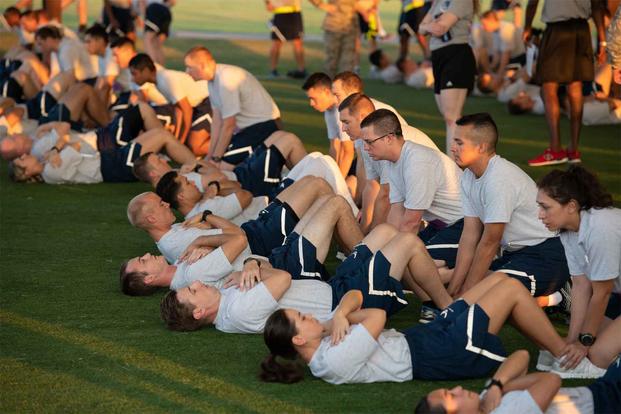For service members who develop exertional rhabdomyolysis, having sickle cell trait does not necessarily equate to increased risk for complications or long-term health problems, a new Air Force study has found.
"Rhabdo," as the condition is known, is a breakdown of muscle that can occur as a result of intense workouts. That releases protein into the bloodstream, where it can cause organ damage, including kidney failure and heart arrhythmias.
The condition has been of concern to the U.S. military for years, with annual cases tripling from 2004 to 2019. In the past 15 years, nearly 5,700 service members have been sidelined by rhabdo, including hundreds who have been hospitalized.
Read Next: How the Air Force Pulled Off The First-Ever Super Bowl Flyover With All 3 Bombers
In 2019, five service members, including two Navy sailors and three airmen, died during physical training or shortly thereafter. At least one of the deaths was attributed to exertional rhabdomyolysis, and three of those who died carried a gene for sickle cell.
The Army, Navy and Air Force all now test for sickle cell trait; the Army just began testing new recruits and soldiers in 2020.
Sickle cell trait is a genetic anomaly in which a person has inherited one normal gene for producing hemoglobin and a sickle cell-carrying gene with the potential to produce defective hemoglobin.
While those with sickle cell trait usually have enough regular hemoglobin to function normally, they are at risk for developing a metabolic condition during exercise known as exertional collapse associated with sickle cell ring, and exertional rhabdomyolysis
Following the 2019 deaths, Air Force researchers decided to look at cases of rhabdo in the service to see whether having sickle cell trait affected outcomes.
"Sickle cell trait (SCT) is associated with incident exertional rhabdomyolysis, but its effect on disease progression and severity is poorly understood," wrote the researchers in a study published January in the Defense Health Agency's Medical Surveillance Monthly.
The researchers examined medical records and cases of 377 diagnoses of rhabdo in the Air Force between 2009 and 2018. They found that of those, 200 had sufficient records to do a full chart review, to include confirming a rhabdo diagnosis as well as confirmation of sickle cell trait.
Within those charts, 185 had been tested or asked about their sickle cell trait; 174 were negative, 11 were positive and 15 had unknown status.
Of the 200 cases reviewed, 110 people were hospitalized, including 98 who did not have the sickle cell trait. Four of the 11 airmen with sickle cell trait were hospitalized, as were eight members of the 15 with unknown status.
Of seven airmen with severe cases who ended up in the intensive care unit, none had sickle cell trait. Treatment for those personnel included dialysis and, in one case, surgery to prevent loss of tissue.
The researchers concluded that medical providers should not presume that having sickle cell trait indicates a person is at higher risk for complications of rhabdo.
"Although SCT is a risk factor for developing exertional rhabdomyolysis, it does not appear to influence its progression or severity," wrote the research team, led by Air Force Lt. Col. Bryant Webber, with the public health and preventive medicine department at the Air Force's School of Aerospace Medicine in Ohio
In reviewing the medical charts of those diagnosed with exertional rhabdomyolysis, the researchers spotted a troubling observation -- that one-third of the cases didn't actually meet the diagnostic criteria for the condition.
The team also found that very few medical records contained information on patients' use of dietary supplements, energy drinks or over-the-counter products, all of which may be associated with exertional rhabdomyolysis.
The team said that, while providers should be vigilant in monitoring for rhabdo, especially during physical training in warm climates, they should ensure that patients meet all the clinical criteria for the condition before diagnosing it.
"This is especially important because the diagnosis carries implications for retention versus separation from military service," they wrote.
And military physicians should do a better job asking patients about supplement use and documenting it in patient records, they added.
"This retrospective analysis reveals a pattern of misdiagnosis and weak documentation of exertional rhabdomyolysis, which may reflect inadequate training of health care providers," they wrote.
Limitations of the study included a lack of documentation for nearly half the cases diagnosed, as well as a small number of personnel identified as having sickle cell trait.
The authors noted that more research is needed on details such as the impact of having sickle cell trait on duty limitations and attrition related to developing rhabdo.
-- Patricia Kime can be reached at Patricia.Kime@Monster.com. Follow her on Twitter @patriciakime
Related: Group Pushes to Give EKGs Before Boot Camp to Stop Sudden Cardiac Deaths












